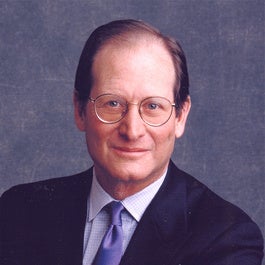
Ben Heineman
AUTHOR OF THE INSIDE COUNSEL REVOLUTION
Ben Heineman was the senior vice president — general counsel for General Electric from 1987 to 2003, and then senior vice president for law and public affairs from 2003 until his retirement in 2005. He served under CEO Jack Welch and then Welch's successor Jeff Immelt. Heineman's model for the modern inside law department is now widely followed in major corporations in the United States and, increasingly, in Europe and Asia. Prior to GE, Heineman was a Rhodes Scholar, editor-in-chief of the Yale Law Journal, law clerk to United States Supreme Court Justice Potter Stewart, public interest lawyer, assistant secretary for policy at the US Department of Health, Education, and Welfare, (HEW) and Supreme Court litigator. Since his retirement, Heineman has taught at Harvard and Yale professional schools and has written and spoken extensively on law, policy, and ethics in the context of globalization.
ACC: Ben, why did you write The Inside Counsel Revolution?
Heineman: Over the past 30 years, there has been a tremendous change in the quality, experience, and skill of inside lawyers — especially the general counsel. This has transformed both law and businesses. It transformed business because the general counsel and the inside lawyers have become essential players on the management team inside the corporation. They handle a wide range of issues beyond the law. They’ve become as important as the CFO and the finance staff to the company because of the challenges in many jurisdictions of the complexity of global business and of “business in society” issues: legislation, regulation, enforcement, ethics, risk, and critics including NGOs and media. At the same time, there’s been a dramatic change outside the company. It’s well known that inside law departments have asserted their authority over outside law firms with respect to “matters” — setting strategy, making decisions, and being deeply involved in the important issues that face the company, whether it’s enforcement, or mergers, or regulatory change, or legislation, or citizenship. Simultaneously, they have asserted their authority over “money” — following the corporate productivity dictum of doing more with less and confronting the law firms that have, in my view, a rather skewed view of productivity, which is basically doing less with more. This change has led law departments to innovate in controlling outside spend both at the front end and back end of matters.
So, as a result of these two changes, the transformation of both inside business and outside in the larger legal community has been an inside counsel revolution. I sought to put in one place a vision of this revolution — of what the inside lawyers do across the most essential issues, including relation with the CEO/board, culture, compliance, ethics, risk, governance, citizenship, and organizational leadership. I thought it was an important thing to set forth a benchmark for inside lawyering now and in the future for people to build on, to disagree with, to debate with the hope that this could help the inside counsel movement grow and flourish by engaging with as complete a vision as I could offer on the most essential aspects of being general counsel and an inside lawyer.
ACC: The subtitle of your book is Resolving the Partner-Guardian Tension, i.e., the in-house counsel needs to be both the business partner and guardian of the company. How does one resolve that tension?
Heineman: Clearly one has to be the partner to the board and to the CEO to have credibility and trust. But the fundamental role of the general counsel is to be guardian of the corporation. You don’t represent the CEO. You don’t represent individual board members as every person who reads this interview knows. Your job is to be the guardian of the corporation, independently evaluating decisions and actions through the lenses of performance, integrity, and risk. And integrity is law, ethics, and values. Those two roles, the partner and the guardian, should be fused. If you’re a good partner, you can be a better guardian. If you’re a good guardian and have credibility in doing that, you can also be a very effective partner.
But the reality is that in too many companies, CEOs don’t understand the law, they don’t appreciate the role of lawyers, there’s group pressure for the lawyers to conform, there is too much speed, and lawyers sometimes have to say, “Let’s take a timeout and get the facts and do the right analysis.” In short, there are many aspects of resolving the partner-guardian tension that are difficult in many corporations. So, the fusion of the partner and the guardian means that the lawyer is involved in all the fundamental activities of the corporation, whether it’s strategy sessions, budget sessions, deal sessions, implementation, and execution. They are deeply involved with the businesspeople in doing the work of the corporation.
But these obstacles that I’ve mentioned sometimes prevent that critical involvement, and therefore you have to overcome them. You can do this and create the fusion between partner and guardian in several ways. One way is to have a strong legal staff that makes sure that they are acting as partner-guardian from the shop floor in China all the way up to the sleek headquarter tower in New York and that there is a unity of view among the lawyers, whether they work for the businesses or for corporate about being guardians first and foremost, and supporting each other.
Secondly, there needs to be an alliance between the top staff leaders, the general counsel, the CFO, the head of compliance, and the head of risk. They all need to be partners and guardians. They should have the same goals for the corporation, which is high performance with high integrity. But often they can be just courtiers; subservient to the CEO and not partners and guardians. So, it’s very important for the general counsel to affect an alliance between the key staff officers on the right vision.
Thirdly, there is the board. The board needs to have an independent relationship with the general counsel. The general counsel must be able to speak privately to the board. He or she must also speak candidly to the board with everyone present on very difficult issues facing the corporation. His or her pay must be set by the board, with special care to make sure that there is a big component that rewards integrity (and penalizes its absence). In addition, the board really must be involved in overseeing both the hiring and any firing of the general counsel to make sure that the hiring is for the right reasons, and that if there is a firing, that too is not because the CEO is doing it out of an emotional pique. It’s because there is a legitimate reason that is not integrity related.
At the end of the day, the fusion between partner and guardian can only occur if the CEO has the vision of high-performance of a high-integrity company — if the CEO wants the general counsel and the inside lawyers to be lawyer-statesmen, it means they first ask “What is legal?” ultimately asking “What is right for the corporation?” CEOs must want general counsel to be partners and guardians and to speak out and give their views on all matters, whether they involve decisions or implementation. The CEOs must have this partner-guardian vision for it to work. Among the best jobs in law are being inside lawyers of a great company. Among the worst jobs in law are being inside lawyers when you’ve got a wrongdoing, unethical, wrong-thinking CEO. And so, it is critical that the CEO — and the board of directors — have this vision, and the CEO and general counsel expressly have an understanding about the complementary roles of partner and guardian when the general counsel is hired or promoted.
I am an optimist. I think that this has happened and is going to happen not because of some nice theory, but because of hard necessity. Companies are facing tremendous commercial complexity with a significant legal component. Companies are also facing many business in society issues: increased regulation litigation enforcement, ethical demands, incessant criticism, and constant scrutiny. Because the general counsel has now become as important as the CFO to the health and durability of the corporation, that basic reality means that the partner-guardian fusion will occur and the tension will be resolved. This is very clearly in the fundamental self-interest of a good company. So, to reiterate, the likelihood of resolving the partner-guardian tension is not necessarily because of theory, it’s because of hard necessity. I believe that this trend has been growing clearly in the last 30 years and will continue into the future — not just in the United States — but in Europe, Asia, and in most major global companies as an essential dimension of the inside counsel revolution.




